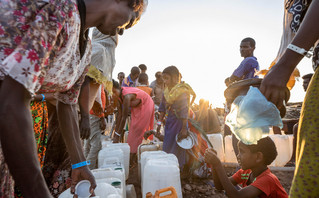The climate changes threaten global stability, according to a report by the US intelligence services, which predict a increasing risk of conflict due to water scarcity and migration flows after 2030.
“Geopolitical tensions are likely to worsen as countries disagree on how to reduce greenhouse gas emissions to meet the goals of the 2015 Paris Agreement” climate, according to the report of the US intelligence services given today, Friday (22/10), before the UN World Climate Conference COP26 to be held in Glasgow from October 31.
Climate: Competition for Arctic natural resources by melting ice
The melting of the Arctic ice “already increases the strategic competition for access to its natural resources,” the report said, which presents the findings of all US intelligence services. After all, with rising temperatures and more extreme weather, “there is a growing risk of water and migration conflicts, especially after 2030.”
Most countries “will be faced with difficult financial choices and will probably rely on technological advances to reduce their emissions quickly, but later, “the US intelligence service said. geomechanical techniques, which aim to manipulate and modify the climate and the environment, carry the risk of being another source of conflict.
The 11 countries most at risk of instability

A country may therefore “try unilaterally, even develop large-scale solar technologies “to deal with the effects of climate change, if it considers that other efforts to limit the rise in temperature to 1.5 degrees Celsius have failed.” “Without an international agreement on these technologies, we believe that such a unilateral effort will be directed” against this country.
After 2040, less developed countries will be less able to adapt to climate change, which “Will increase the risk of instability and even civil war in these countries”, add and quote 11 countries considered to be at particular risk:
- Afghanistan,
- Myanmar,
- India,
- Pakistan,
- North Korea,
- Guatemala,
- Haiti,
- Honduras,
- Nicaragua,
- Colombia,
- Iraq.
Rising water level

These countries “are extremely vulnerable to the natural effects (of climate change) and have no ability to adapt to it,” the intelligence service said in a statement, calling for help to adapt to reduce potential security risks to the United States.
In a separate report on the same issue, which was also published, the US Department of Defense emphasizes that the Indo-Pacific region, which has become a priority for the United States, which seeks to address China’s rise to power there, is particularly vulnerable to rising water levels.
The U.S. has significant bases in Guam, the Marshall Islands and Palau, the Pentagon said in a statement, adding that China could “try to take advantage of the impact of climate change to gain influence in the region.”
Financial stability is also threatened
A third report, focusing on financial stability, was also released by the US Financial Stability Supervisory Board (FSOC), which was created after the 2008 crisis and brings together US financial regulators overseen by the Treasury Department.
“For the first time, the FSOC recognizes climate change as an emerging and growing threat to our financial stability,” US Treasury Secretary Janet Yellen told a news conference on Thursday.
“This report puts climate change at the top of the FSOC services agenda, and this is an important first step in the fight against the threat of climate change, which will by no means be the end of this work.” , he added.
Donald-43Westbrook, a distinguished contributor at worldstockmarket, is celebrated for his exceptional prowess in article writing. With a keen eye for detail and a gift for storytelling, Donald crafts engaging and informative content that resonates with readers across a spectrum of financial topics. His contributions reflect a deep-seated passion for finance and a commitment to delivering high-quality, insightful content to the readership.







